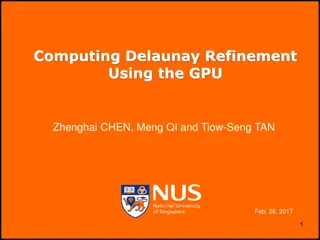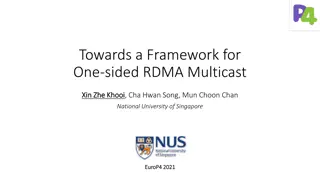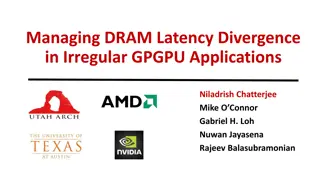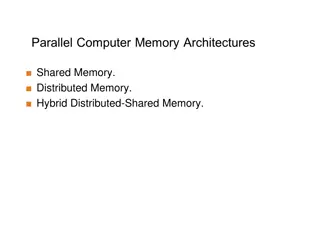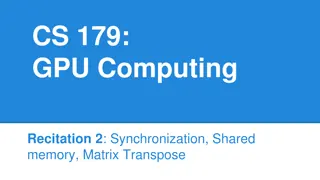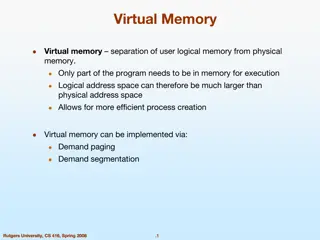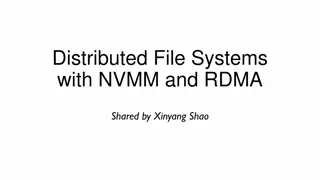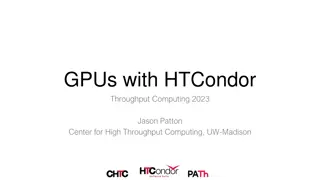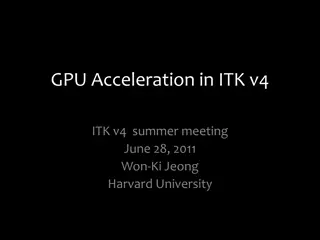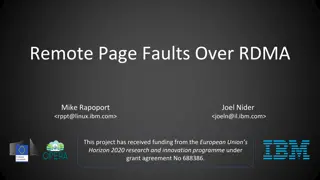Efforts to Enable VFIO for RDMA and GPU Memory Access
Efforts are underway to enable VFIO for RDMA and GPU memory access through the creation and insertion of DEVICE_PCI_P2PDMA pages. This involves utilizing functions like hmm_range_fault and collaborating with companies like Mellanox, Nvidia, and RedHat to support non-ODP, pinned page mappings for improved performance and functionality.
Download Presentation

Please find below an Image/Link to download the presentation.
The content on the website is provided AS IS for your information and personal use only. It may not be sold, licensed, or shared on other websites without obtaining consent from the author.If you encounter any issues during the download, it is possible that the publisher has removed the file from their server.
You are allowed to download the files provided on this website for personal or commercial use, subject to the condition that they are used lawfully. All files are the property of their respective owners.
The content on the website is provided AS IS for your information and personal use only. It may not be sold, licensed, or shared on other websites without obtaining consent from the author.
E N D
Presentation Transcript
get_user_pages & ZONE_DEVICE
ZONE_DEVICE Background ZONE_DEVICE holds many interesting page types for RDMA MEMORY_DEVICE_PRIVATE aka on-GPU memory MEMORY_DEVICE_FS_DAX/DEVDAX MEMORY_DEVICE_PCI_P2PDMA ZONE_DEVICE pages are an alternative to VM_IO | VM_PFNMAP Injects a struct page
VFIO to RDMA P2P Enable various interesting SPDK based solutions with NVMe and NVMe over Fabrics Be the first kernel user of user space mapped DEVICE_PCI_P2PDMA pages Use RDMA ODP MR s (like DAX) and extended hmm_range_fault() More drivers map their BAR memory as PCI_P2PDMA, ie RDMA BAR, RDMA on-chip memory, pinned GPU BAR memory Support non-ODP, pinned page mappings VFIO DMA mapped transfer Remove ugly hack in VFIO for P2P
Wide ranging effort Enable VFIO to create and insert DEVICE_PCI_P2PDMA pages RDMA to use hmm_range_fault() for ODP hmm_range_fault() to know how to handle PCI_P2PDMA pages RDMA to know what to do with the result of hmm_range_fault() to get a dma_addr_t IOMMU drivers to understand PCI_P2PDMA pages and BAR backed physadd_t s PCI layer to provide information if P2P is even possible
Background Quite a lot like get_user_pages(), but different API, different implementation Returns something like phys_addr_t or d with flags per page (but all users currently still need struct page in the end) Does not pin pages Can avoid faulting pages and return NULL pages Understands more of ZONE_DEVICE than GUP Users are coming, nouveau and amdgpu are merged already RDMA ODP is in progress Lots of collaboration & polishing right now Mellanox/Nvidia/RedHat/HCH
DMA Fault for ZONE_DEVICE hmm_range_fault() will eventually know about the requesting struct pci_device Will only return phys_addr_t s that device can DMA to Logically, if the page is not CPU memory we want it to trigger DMA fault to create a DMA address For GPU drivers that need to make DEVICE_PRIVATE pages accessible May also be relevant to PCI_P2PDMA? Details are unclear
Pinned Pages version A key difference between hmm_range_fault() and get_user_pages() is the former does not pin pages Need a page pinning API that understands these new ZONE_DEVICE schemes Enhance GUP? get_user_pages_dma() ? Enhance hmm_range_fault? FLAG_PIN_PAGES ? Something else?
Future? Unify get_user_pages() and hmm_range_fault()? Driver focused APIs more directly designed for the GUP -> SGL -> DMA_MAP work flow?
get_user_pages(): details For: LPC 2019: RDMA microconference session: get_user_pages() & ZONE_DEVICE
Background: get_user_pages (gup) Proposed new gup behavior for: p2p, HMM, ZONE_DEVICE, file-backed pages gup is already large and complex ~100 callers 17+ FOLL_* flags that alter behavior (and interact with each other) 10-15+ API calls (several of which call each other), and growing fast Originally mm-centric unaware of file systems pages unaware of device pages *especially* unaware of device-to-device memory: p2p gup APIs are misleading and widely misunderstood No way to identify gup d pages
populate migrate split mlock DAX... touch DIO: short- term pin HMM, ODP: no pin get_user_pages follow_page get_user_bvec ?? get_user_sgl ?? vaddr_pin_pages ?? hmm_range_fault open-coded ... RDMA: long-term pin p2p?
Missing (maybe) from gup File system awareness Peer mappings Should we allow get_user_pages on ZONE_DEVICE pages? Interaction with HMM API optimizations SGL: struct scatterlist API? bvec: struct bio_vec API? wrapper functions, FOLL_* flags Clarity on which API calls pin pages Differentiate between hard pin and soft pin ?
Ideas, solutions in progress File system awareness: vaddr_pin/unpin_pages (Ira Weiny, later today) FOLL_PIN | FOLL_LONGTERM Peer mappings: Should we allow get_user_pages on ZONE_DEVICE pages? Interaction with HMM: how should this work? API optimizations SGL (struct scatterlist) callers: get_user_sgl()? bvec: struct bio_vec: get_user_bvec() / put_user_bvec()? wrapper functions, FOLL_* flags release_pages()-like batched release Clarity on which API calls pin pages Differentiate between hard pin and soft pin (and no pin) Use FOLL_PIN to increment a separate pin count (separate from FOLL_GET)
vaddr_pin_pages Ira Weiny will cover this in detail, but vaddr_pin_pages (vaddr_pin_user_pages? Naming is in progress ) Includes a pinned by context: mm, fd Must be paired with vaddr_unpin_pages Which calls put_user_page Solves the connection to user space, to file system: file leases








